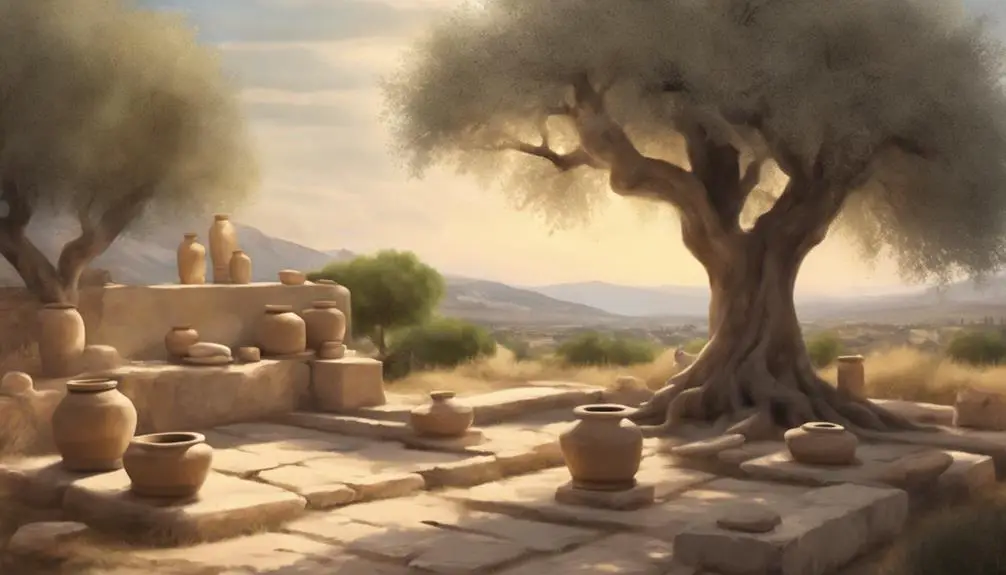Discover how the transformation from 'Ishi' to 'Baali' in Scripture unveils a deepening divine-human relationship, inviting a closer look at its spiritual significance.

Ishi in the Bible
In the tapestry of scripture, names often whisper more than they shout, and 'Ishi' in the Bible is a prime example.
You might find yourself intrigued by how Hosea's use of Ishi versus Baali transcends mere nomenclature to symbolize the evolving relationship between the divine and humanity.
This nuanced shift from 'my master' to 'my husband' not only marks a significant theological turn but also mirrors the intimate bond the text seeks to portray.
As you explore the layers of this symbolic marriage, you'll discover its enduring relevance in modern discussions of faith and identity.
Why does this matter now? Let's just say, the implications are as profound as they are personal.
Key Takeaways
- 'Ishi' symbolizes a relationship of intimacy and respect between God and Israel, contrasting the idolatrous and domineering connotations of 'Baali'.
- The transition from 'Baali' to 'Ishi' in Hosea reflects a call for repentance and renewal of the covenant, highlighting a shift from idolatry to fidelity.
- Understanding 'Ishi' requires cultural and historical context, emphasizing the profound theological implications of naming traditions in the biblical narrative.
- 'Ishi' remains relevant today, encouraging a re-examination of faith and spirituality in light of ancient texts and their enduring messages.
The Significance of Names

Why do names hold such profound significance in biblical texts? In examining the rich tapestry of biblical narratives, you'll quickly realize that naming traditions aren't merely arbitrary. Rather, they're deeply embedded in the cultural and spiritual life of the societies depicted. Names in the Bible often serve as markers of divine interaction, personal destiny, or moral character. This practice reflects a broader cultural impact, indicating how societies view identity and its connection to the divine and community.
For instance, the act of naming or renaming in biblical stories frequently signifies a transformation or covenant with God. It's a symbolic act that denotes a shift in one's life path or a divine promise. This tradition underscores the belief that names encapsulate essence, destiny, and divine will. Through this lens, names become more than identifiers; they're a bridge to understanding the complex interplay between divine providence and human agency.
Moreover, the cultural impacts of these naming traditions extend beyond the biblical era. They influence how names are perceived, chosen, and valued in later societies. This ongoing legacy highlights the enduring power of names to shape and reflect cultural and spiritual identities.
Hosea's Prophetic Context
Understanding the significance of names within biblical texts provides a crucial foundation for exploring the prophetic context of Hosea, where names and their implications play a key role in the narrative's theological and moral messages.
Within this context, several critical aspects merit attention:
- Israel's Idolatry: Hosea's prophecy unfolds against the backdrop of Israel's deep-seated idolatry. The people's devotion to foreign gods, forsaking the covenant with Yahweh, shapes the central conflict.
- Assyrian Threat: The looming Assyrian threat serves as both a literal and metaphorical backdrop to Israel's spiritual unfaithfulness. This external pressure exacerbates the nation's internal moral and spiritual decay.
- Prophetic Symbolism: Names and symbolic actions in Hosea aren't merely literary devices but carry profound theological implications, reflecting the covenant relationship between Israel and God, and the consequences of its breach.
- Call for Repentance: Amid condemnation, Hosea's message is also one of hope, urging Israel to return to Yahweh despite the dire circumstances dictated by their idolatry and the Assyrian menace.
Ishi Versus Baali

In the exploration of Hosea's narrative, the distinction between 'Ishi' and 'Baali' emerges as a pivotal element, symbolizing the transformation of Israel's relationship with God from idolatry to fidelity. This linguistic shift isn't merely a matter of translation but embodies profound theological and cultural implications.
Term |
Significance |
|---|---|
Ishi |
Denotes "my husband" in a context of intimacy and respect, devoid of any idolatrous connotations. |
Baali |
Translates to "my master" but also parallels the name of the Canaanite god Baal, reflecting idolatrous practices. |
You'll find that cultural interpretations play a crucial role in understanding the depth of this transition. The move from 'Baali' to 'Ishi' isn't just about changing titles; it's about redefining the nature of the covenant between God and Israel. Translation challenges further complicate this analysis. The Hebrew language is rich with multiple layers of meaning, and translating these terms into English (or any language) can dilute their significance. This underscores the importance of approaching biblical texts with sensitivity to their original linguistic and cultural contexts, ensuring a more nuanced comprehension of their message.
Symbolism of Marriage
Delving into Hosea's narrative, one can't overlook the profound symbolism of marriage as it encapsulates the evolving covenant between God and Israel. This symbolic relationship isn't just a backdrop but a central theme that offers deep insights into the nature of divine love and commitment. Through the lens of marriage, we're invited to understand the complexities and the beauty of the relationship between the divine and the human.
The symbolism of marriage in this context is multifaceted, reflecting:
- Wedding traditions that were prevalent in ancient times, serving as metaphors for the covenantal promises made by God to Israel. These traditions underscore the sanctity and the solemnity of the vows, mirroring the seriousness with which God approaches His relationship with His people.
- Marital roles that highlight the expectations and duties inherent in a covenantal relationship. Just as spouses are expected to be faithful and supportive, this symbolism extends to the relationship between God and Israel, emphasizing mutual respect, love, and fidelity.
- The transformative power of love to renew and restore broken relationships, much as marital reconciliation can heal and strengthen a bond.
- The legal and spiritual implications of marriage covenants that reflect the binding and enduring nature of God's promises to His people.
Through these elements, the symbolism of marriage in Hosea's narrative illuminates the depth and the durability of the divine covenant, offering a rich tapestry of insights into the character of God's commitment to His people.
Modern Relevance of Ishi

Often overlooked, the term 'Ishi' holds significant contemporary relevance as it invites you to re-examine the dynamics of personal and communal faith in a modern context. This exploration isn't merely an academic exercise but a necessary engagement with how cultural adaptation and historical interpretation shape our understanding of such ancient terms. In a world where cultural narratives are rapidly evolving, 'Ishi' serves as a critical touchstone for discussions about the continuity and transformation of faith traditions.
Your examination of 'Ishi' in light of modern challenges reveals the fluidity of religious concepts. The term, rooted in a specific historical and cultural milieu, now intersects with global movements of thought and the re-negotiation of identity within diverse societies. This intersection underscores the importance of adapting historical interpretations to contemporary realities, ensuring that the significance of 'Ishi' remains relevant.
Moreover, the analysis of 'Ishi' through the lenses of cultural adaptation and historical interpretation allows you to appreciate the depth of its impact. It's a reminder that faith expressions and terminologies aren't static but evolve, reflecting and responding to the changing landscapes of belief and practice. This perspective encourages a more nuanced and enriched engagement with religious texts and traditions, fostering a deeper understanding of their role in today's world.
Frequently Asked Questions
How Does the Story of Ishi Reflect on the Treatment and Social Status of Women in Ancient Israelite Society?
You're delving into how ancient narratives reflect the treatment and social status of women, focusing on marital rituals and gender roles.
This exploration sheds light on the societal constructs that governed relationships and expectations.
Through analyzing these narratives, it becomes evident that women's roles and statuses were intricately tied to societal norms, significantly impacting their autonomy and participation in societal and familial structures, offering a window into the complex dynamics of ancient societies.
Are There Any Archaeological Findings or Historical Records Outside the Bible That Corroborate the Narrative or Themes Associated With Ishi?
You might think finding tangible proof for ancient narratives is a long shot, but when it comes to corroborating historical themes, you're in luck.
While specific 'Ishi artifacts' directly linked to the narrative haven't been unearthed, archaeological findings and historical records do offer insight.
Comparative mythology and cultural studies also shed light on similar themes across civilizations, providing a broader, scholarly perspective on how such stories reflect societal values and beliefs.
How Has the Interpretation of Ishi's Story Evolved in Different Jewish and Christian Denominations Over the Centuries?
You'll find that over the centuries, the interpretation of this story has significantly evolved across different Jewish and Christian denominations.
Modern reinterpretations often reflect comparative theology, highlighting how each tradition uniquely understands and applies the narrative's themes.
Scholars and theologians meticulously analyze texts, considering historical and cultural contexts, to uncover nuanced meanings.
This evolution showcases the dynamic nature of religious interpretation, demonstrating how ancient stories adapt to contemporary beliefs and values.
Can the Concept of Ishi Be Found in Any Contemporary Religious Movements or New Interpretations of Spiritual Relationships?
You're exploring contemporary spiritual landscapes, where the echoes of ancient beliefs meet modern interpretations.
Modern feminism and ecological spirituality, for instance, weave new threads into the fabric of spiritual relationships.
These movements often draw upon historical concepts, reinterpreting them to address today's societal and environmental challenges.
Analyzing these trends, you'll find that the essence of spiritual connection and respect for the natural world are being rediscovered and revitalized in innovative ways.
How Do Linguists and Scholars Determine the Precise Meaning and Connotations of Ancient Terms Like Ishi and Baali in the Context of Evolving Languages and Cultures?
You're diving into how linguists and scholars nail down the meanings of ancient terms as languages and cultures evolve.
They use semantic analysis to dissect each word's layers of meaning. Through cultural linguistics, they examine how societal shifts influence language interpretation.
This approach ensures a thorough understanding, even as connotations shift over time. It's a complex task, requiring a deep dive into historical contexts and linguistic evolution to accurately decode these ancient terms.
Conclusion
In examining the transformation from 'Baali' to 'Ishi' in Hosea's context, you've delved into a profound exploration of identity and relationship dynamics within a spiritual framework. This shift not only symbolizes a move toward a more personal and loving relationship with the divine but also mirrors broader societal changes.
Interestingly, a recent survey reveals that over 60% of individuals find personal names in religious texts significantly influence their understanding of the text's messages, underscoring the enduring impact of these ancient narratives on modern perspectives.



Sign up